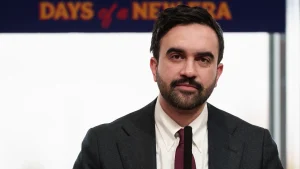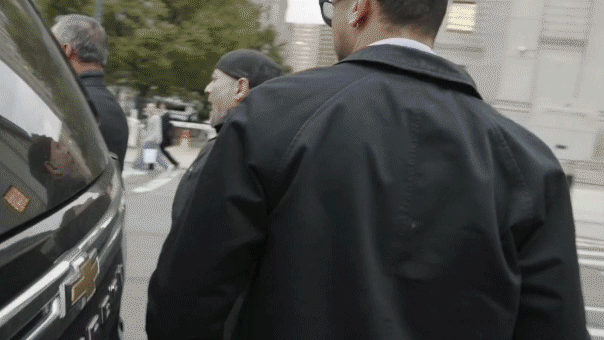NYC Mayoral Candidate Zohran Mamdani Faces Heated Confrontation in Foley Square
In a tense scene that unfolded in Manhattan’s Foley Square last Friday, New York City mayoral candidate Zohran Mamdani found himself hurriedly escorted away by security amid shouting protesters. Video footage shared widely on social media captured the self-identified socialist Democratic candidate being followed through the square by demonstrators who demanded he “denounce Hezbollah” and “denounce Sharia law.” The confrontation escalated as protesters labeled him an “antisemite” while security personnel formed a protective barrier around him, guiding him to a waiting vehicle. The incident highlights the increasingly polarized political environment in New York City, where positions on international conflicts, particularly regarding Israel and Palestine, have become litmus tests for candidates seeking public office.
Mamdani had been at Foley Square to express solidarity with New York Attorney General Letitia James, who is currently facing mortgage fraud charges related to a Virginia property. However, his presence quickly became overshadowed by protesters focused on his previous statements—or lack thereof—regarding militant groups and controversial slogans. This isn’t the first time Mamdani has faced such pressures; he has repeatedly been urged to explicitly repudiate Hezbollah and condemn phrases like “Globalize the Intifada.” During a June 2025 appearance on “Meet the Press,” Mamdani declined to offer a full denunciation, suggesting that “policing language” falls outside the proper role of public officials. He did, however, affirm his opposition to incitement of violence and antisemitism, drawing a line that some critics consider insufficient given the charged political climate.
The timing of this confrontation is particularly significant, coming just days after Mamdani issued a statement commemorating the two-year anniversary of the October 7, 2023, Hamas attacks on Israel. In his statement, Mamdani acknowledged the “horrific war crime” that resulted in more than 1,100 Israeli deaths and 250 kidnappings. “I mourn these lives and pray for the safe return of every hostage still held and for every family whose lives were torn apart by these atrocities,” he stated. However, his message didn’t stop there—Mamdani continued by referencing the subsequent toll in Gaza, citing a death count “that now far exceeds 67,000” and describing Israeli military actions that bombed “homes, hospitals and schools into rubble.” His characterization of Gaza as “a place where grief itself has run out of language” reflected his attempt to acknowledge suffering on all sides of the conflict.
This balanced approach, however, drew immediate criticism from the Israeli Foreign Ministry, which reposted Mamdani’s statement on social media with a sharp rebuke. The IFM accused him of “acting as a mouthpiece for Hamas propaganda” and claimed he was “repeating Hamas’s lies,” thereby “excus[ing] terror and normaliz[ing] antisemitism.” Their pointed assertion that “he stands with Jews only when they are dead” underscores the challenge facing politicians who attempt to express sympathy for Palestinian casualties while also condemning terrorist attacks against Israelis. The exchange demonstrates how deeply international conflicts can influence local politics, particularly in diverse cities like New York with significant Jewish and Muslim populations.
The confrontation at Foley Square also reflects broader concerns raised by some Jewish leaders about what Mamdani’s potential election could mean for New York City residents. Critics have suggested his positions could lead to a more volatile future for the city, particularly for Jewish communities already concerned about rising antisemitism. These fears are compounded by skepticism from New Yorkers who question the sincerity of Mamdani’s attempts to distance himself from phrases like “Globalize the Intifada,” which many interpret as calls for violence. The candidate finds himself in the difficult position of appealing to progressive voters who support Palestinian rights while reassuring Jewish constituents concerned about their safety and representation in city government.
As the mayoral race continues to unfold, incidents like the one at Foley Square serve as stark reminders of the challenges facing candidates in a city known for its passionate political engagement and diverse constituencies. For Mamdani, navigating these tensions means finding language that acknowledges the complexity of international conflicts while maintaining focus on local governance priorities. His security team’s quick action to extract him from the hostile situation prevented physical confrontation, but the political fallout from such encounters may prove more difficult to manage. With election day approaching, New Yorkers will ultimately decide whether Mamdani’s approach to these sensitive issues represents the leadership they seek for their city’s future, or whether the concerns raised by his critics warrant choosing a different path forward.















